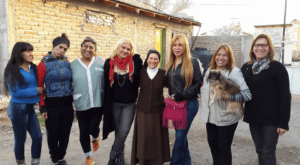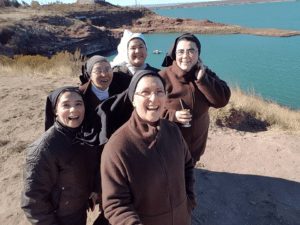The term “LGBT” was recently used for the first time in a Vatican document. The working document setting the agenda for the Synod on the Youth taking place next Fall notes, “Some LGBT youth…wish to benefit from greater closeness and experience greater care by the Church.”
Sister Monica Astorga, an Argentinian Discalced Carmelite Nun, has been working with transgender women since 2005. In an interview this past June, she recounted a similar desire for “closeness” among the LGBT community.
“For me, God is very present in every encounter I have with trans women,” She said. “When they arrive at the monastery, it is to ask to feel a hug, for someone to listen to their pain and to show them God.” Sister Monica, whose ministry has received support from Pope Francis, is not the only Catholic sister working within the trans community. Indeed there are multiple stories of sisters walking with and advocating for this marginalized community.
Sister Monica recounted one story in particular that shows the desire for community and hope among the women she works with. “One day in January, on a very hot day, a 27-year-old trans girl arrived crying. She said to me, ‘Sister, please tell me about God.’ After a long talk she asked me to please help her out of prostitution. She told me how much of a torment it was to be on the streets. Now, years later, she has been working in a clinic for over a year and is studying at the university.”
 Sister Monica’s call to work with the transgender community came when a trans woman was referred to the Carmelite Monastery after making a donation to her local parish. Sister Monica met with her and asked about her dreams. She said she dreamed of dying in a clean bed. From there, it was clear that God was calling Sister Monica to walk with these women. She began regularly inviting trans women to the monastery.
Sister Monica’s call to work with the transgender community came when a trans woman was referred to the Carmelite Monastery after making a donation to her local parish. Sister Monica met with her and asked about her dreams. She said she dreamed of dying in a clean bed. From there, it was clear that God was calling Sister Monica to walk with these women. She began regularly inviting trans women to the monastery.
She set out to uncover the dreams hidden beneath the pain and abuse and walk with the women in pursuing them. At the beginning, “Many did not have any dreams. They lived day to day wondering who would be the next to die.” Through monthly prayer and support meetings, the women began to dream of leaving prostitution, going back to school, and having a safe home to live in.
Sister Monica worked with the local bishop to find an old house that could be converted into a home for these women. Due to discriminatory hiring practices, work is hard to come by for trans people. Sister Monica set out to create employment opportunities whereby the women would have a way out of prostitution and still earn money. She turned part of the house into a sewing workshop and a beauty salon where the women now work and earn money.
She is currently working to add a full time home for drug and alcohol addiction recovery. She recently worked with the government to purchase an old apartment building which she is now renovating into 12 apartments for trans women with more delicate health.
Sister Monica laments the low life expectancy for transgender individuals, which in Argentina is 40 years. In America, there are roughly 1.4 million people who identify as transgender. Within the trans community, persons are twice as likely to experience homelessness as the national average, nearly 50% have attempted suicide. Trans individuals are twice as likely to be victims of hate crimes than other minority groups.
“The gospel is very clear. Who do we see Jesus with?” Sister Monica said when asked about the controversial nature of LGBT ministry within the Church. Due to the discrimination, violence, and marginalization of transgender individuals the ministry is not the least bit controversial in her mind. It is simply a mandate of the gospel.
The ministry, however, was difficult at first. She shared, “They could not believe that a religious woman was caring about them. They were used to rejection from all or most of the members of the Church. When they began to understand that I was only interested in their good, we formed a very beautiful bond.”
It is a bond rooted in prayer. “This ministry is very close to my life of prayer,” Sister said. “I present each face and name to God. I give Him their anguish and I speak a lot to Him about each trans person I meet.”
While Pope Francis has supported Sister Monica’s ministry, there is no question that LGBT ministry is colored in controversy due to the Church’s rejection of Gender Theory, which holds that biological sex is separate from one’s gender. According to Gender Theory, regardless of biological sex, one could identify with a variety of genders. Pope Francis has been especially vocal in his worries about this theory, even calling it “ideological colonization.” At the same time, he has himself reached out to transgender individuals, meeting with them at the Vatican.
The controversy comes from a worry or skepticism that ministry or even association with the LGBT community necessitates a dilution or rejection of the Church’s teaching. For Pope Francis, that is certainly not the case. For the Carmelite, worrying is unnecessary.
“If we view this issue from an ideological perspective, that of liberal or conservative, we will continue to condemn people. Rather, I invite people to listen to the stories of transgender people and when you listen, listen first with your heart. Begin to meet transgender people and listen to their dreams. In doing so, leave the ideology and the judgement and accompany these people in your heart.”
Sister Monica’s outlook may not be satisfying for those who worry that accompanying and befriending trans people misses another important step. For Sister Monica, however, our own conversion seems more important. Learning to accompany anyone, without judgement, and with a pure heart is perhaps an even more daunting task than clarifying the philosophical and theological teachings on human nature and flourishing when it comes to sex and gender.
 Of course, the two are not mutually exclusive, and in fact are both necessary. In Sister Monica’s mind, one comes before the other. This call to conversion, to a bigger and purer heart, is not always satisfying, and is uncomfortable. If our goal however, is a “very beautiful bond,” or a bridge, if you will, ultimately rooted in Christ, conversion seems necessary. As Fr. James Martin points out, “It costs when you live a life of respect, compassion and sensitivity.”
Of course, the two are not mutually exclusive, and in fact are both necessary. In Sister Monica’s mind, one comes before the other. This call to conversion, to a bigger and purer heart, is not always satisfying, and is uncomfortable. If our goal however, is a “very beautiful bond,” or a bridge, if you will, ultimately rooted in Christ, conversion seems necessary. As Fr. James Martin points out, “It costs when you live a life of respect, compassion and sensitivity.”
It is safe to say that our Church would be different and would be perceived differently if, like Sister Monica, more Catholics spent time presenting the faces, names, and anguish of transgender people to God. It would be easier for LGBT Catholics to trust that the Church does have their flourishing in mind, if a desire to listen with our hearts was more clear.
Acknowledging the desire that LGBT youth have for closeness with the Church is a good step forward. A second step, following the advice of Sister Monica, could be to reflect on the Church’s own capacity and desire to be close with the LGBT community, and ask God to increase it.


